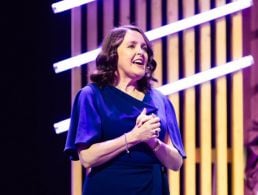If you’re worried you don’t have the technical skills to apply for a graduate programme in tech consultancy, think again.
If you’re in your final year of third-level education, you might be starting to think about your career options going forward. What better way to consider different options than to hear from graduates who have walked the path before you?
Edward Tsang entered the Accenture graduate programme and is now working within the company’s health and public services practice. Here, he discusses his experience on the graduate programme.
What did you study in college?
Economics and mathematics in Trinity College Dublin.
With this programme, are you now working in your desired industry?
I’m currently working within our health and public services practice as part of the analytics grad programme, which I’m really enjoying. It may not be the first industry you think of for someone with a maths and economics background, but the skills you learn are so versatile and transferable that you can work across almost any industry. Whether I decide to continue to deepen my expertise in public services or switch to another industry, the same skills, techniques and logic will apply.
What drew you to Accenture when you were seeking work as a graduate?
For me, it was primarily the people and the opportunity to learn, develop and gain a wide range of experience that drew me to Accenture.
I met a management consultant at a careers event in college. We chatted about the work he was doing for the company, the people he was meeting and how much he was learning. I decided I wanted to work with people like him.
Another factor that appealed to me was the diverse range of clients and projects you can work on, from life sciences to financial services, retail, communications, technology and beyond. It’s great experience, especially early on in your career, as you get the opportunity to apply the theory you learn at university to a diverse range of projects that solve real-life problems.
What expectations did you have before you began the programme?
I was excited to join Accenture’s grad programme back in October 2017. I didn’t know what to expect, but I was keen to learn as much as I could. My biggest worry was that I may not have been technical enough, but the grad programme offers a lot of comprehensive training. The training is spread across on-the-job training, mentorship and formal classroom training.
There’s also an online library with hundreds of free on-demand courses, which are a fantastic resource if you need quick access to learning or are between projects.
Through the training curriculum, I’ve learned how to use visual analytics and traditional coding tools such as Tableau, QlikView, Scala, Spark, SAS and Python.
Mentorship is another key part of the culture here. When you join the company, you are assigned a career counsellor and a buddy. You have meetings with your career counsellor every couple of months to discuss your strengths, career priorities and any challenges you might be facing.
What duties and responsibilities were you given initially?
I was very lucky to have a brilliant senior manager and a consultant to guide me in my first project. They were incredibly helpful and challenged me to develop continuously.
Initially, they gave me small tasks, so they could analyse my thought process, identify my strengths and what I could improve on – for example, analysing data and testing coding logic.
Each time I improved, they would give me a more difficult task – for example, creating my own dashboards and code. I would then go on to develop dashboards for reporting, creating my own SQL queries and so on. I was gradually given more responsibility as I continued to learn and polish my skills.
Did the scope of your work change as the programme progressed?
The nature of the analytics work remains relatively constant. The core work is analysing data, gaining insights and working to improve predictive models.
What does change as you progress through the programme are the projects you work on, responsibilities and colleagues’ expectations. The more you develop your core consulting skills, the more your colleagues trust you to engage with clients and lead out on more work.
Can you describe a typical day in your role?
It sounds clichéd but every day is different because there are so many different projects. In the time I’ve been here, I’ve been on three different projects, working with three completely different clients.
- Project One: Visualising sales performance for an international retail chain. My first project was with a large, international retail client. My primary role was in visual analytics, where I would help build reporting dashboards to enable the client to view their sales data during any period of time, and in a specific country or city, to help them make confident decisions and forecasts.
- Project Two: Helping decision-makers with dashboards for an Irish bank. My second project was in an Irish bank, where I was very heavily involved with the data management team and developed my core consulting skills. Again, I helped create dashboards, which were used in reporting and helped the client in their business analysis, decision-making and planning.
- Project Three: Preventing crime with predictive analytics in health and public service. My current project is for a health and public services client as part of a global team. It is an amazing project where I get to travel internationally. We’re using predictive analytics to predict the likelihood of an individual committing a crime based on network analysis. It’s a really exciting project, where I feel like I’m making a difference and keeping people safe.
How do your responsibilities compare to more experienced employees’?
Our more experienced team members are always there to offer support. They are there to bounce ideas off, for guidance and advice. We’re fortunate to have a vast number of experts, who you can get advice from when conducting your data analysis.
Typically, more experienced employees have more responsibility in the management side of things, such as client and stakeholder management, project management and team management.
Do you feel more prepared for working life after completing this programme?
Yes. I’ve matured as a person and gained invaluable experience. Being thrown right in and having to perform like a consultant has made me more aware of how I interact with people, and those are skills that will be beneficial to me both within and outside of Accenture.
Why should someone apply to the graduate programme at Accenture?
For me, there are two main reasons why grads should apply to Accenture: the experience and the people. The analytics community is particularly tight-knit. Everyone is very familiar with each other and more than willing to help you. I am still amazed at how willing people are to help – even our colleagues around the world. It is ingrained in the culture and is something that really helped me settle into the company.
The opportunity to gain experience working in different industries is also something that I really enjoy. In my time here, I’ve experienced working in the business and data side of a large international retail chain, the financial services sector, and in the health and public services industry. I don’t think that’s something many graduates can say in other graduate programmes.




